-
06-01-2015
Elderly families of South of Brazil in the Health Strategy
Revista Brasileira de Enfermagem. 2015;68(3):406-413
Abstract
Elderly families of South of Brazil in the Health Strategy
Revista Brasileira de Enfermagem. 2015;68(3):406-413
DOI 10.1590/0034-7167.2015680305i
Views0See moreABSTRACT
Objective:
to characterize families and health status of the elderly in the Family Health Strategy and to verify the association of family composition with sociodemographic characteristics and health of the elderly.
Method:
population-based study with 215 families and 266 elderly, linked to the Family Health Strategy from a city of Rio Grande do Sul state.
Results:
there was predominance of nuclear family composition, considered as the main source of informal support, families of female elderly (62.6%) and cardiovascular complication. The nuclear structure was signifi cantly associated with female gender (PR = 0.77; p = 0.025) and smoking (PR = 1.35; p = 0.009).
Conclusion:
the results reinforce the need to maintain a network of formal and informal support to the elderly and their families to preserve the independence or to postpone the decline in functional capacity.
-
06-01-2015
From real to ideal – the health (un)care of long-lived elders
Revista Brasileira de Enfermagem. 2015;68(3):398-405
Abstract
From real to ideal – the health (un)care of long-lived elders
Revista Brasileira de Enfermagem. 2015;68(3):398-405
DOI 10.1590/0034-7167.2015680304i
Views0See moreABSTRACT
Objective:
to analyze similarities and dissimilarities in the meanings assigned to health care by long-lived elders and nursing professionals in a healthcare setting.
Method:
ethnographic qualitative research, based on the Spradley-McCurdy method and the interpretive anthropology of Geertz and Kleinman. The sample consisted of 20 key informants. Data were collected through participatory observation and ethnographic interviews from March to October 2013 and analyzed in domains, taxonomies and cultural themes.
Results:
Six domains and cultural taxonomies emerged and revealed reasons, attributes, and resources in providing care in relationship to long-lived elders and nursing professionals; fi nally, the following cultural theme emerged: the real to the ideal – the health (un)care of long-lived elders.
Conclusion:
The study showed the distance between the desired and actual health care provided to aged people in the scenario studied.
-
06-01-2015
Rescuing the pleasure of playing of child with cancer in a hospital setting
Revista Brasileira de Enfermagem. 2015;68(3):391-397
Abstract
Rescuing the pleasure of playing of child with cancer in a hospital setting
Revista Brasileira de Enfermagem. 2015;68(3):391-397
DOI 10.1590/0034-7167.2015680303i
Views0See moreABSTRACT
Objective:
to dimension spaces and people that act on playing of children with cancer in outpatient treatment.
Method:
qualitative research developed with the creative sensitive method. A total of twenty two family members of seven children with cancer in outpatient treatment at a public hospital in Rio de Janeiro participated of this research. Data were generated in the family members’ homes, from September 2011 to May 2012.
Results:
after the diagnosis of childhood cancer, there was a change of scene and in the people who interact and play with children. Hospital has a central place for it, since children discover the pleasure of playing in this setting.
Conclusion:
the health care professional, especially nurses, who work on hospital care needs, should develop the ability of facilitate playing and therefore, enable care that promotes childhood development.
-
06-01-2015
Child Health Surveillance: nurses perspective
Revista Brasileira de Enfermagem. 2015;68(3):384-390
Abstract
Child Health Surveillance: nurses perspective
Revista Brasileira de Enfermagem. 2015;68(3):384-390
DOI 10.1590/0034-7167.2015680302i
Views0See moreABSTRACT
Objective:
to analyze conceptions of nurses on child health surveillance in family health units.
Method:
a qualitative study with thematic analysis of the data, based on the paradigm of Health Surveillance. Interviews were conducted with 13 nurses in a countryside city in the state of Sao Paulo.
Results:
nurses conceived child health surveillance as an active monitoring, which should be comprehensive, identifying risks/vulnerabilities, through multidisciplinary and intersectoral actions that are dependent on maternal involvement. We found partial development of these assumptions in practice, due to diffi culties such as lack of maternal involvement in the proposed actions, lack of time for discussion and adoption of measures in the units and disarticulation between levels and sectors of the city.
Conclusion:
a greater political and technical investment is needed to ensure the adoption of this model in different sectors and levels of care of the city.
-
06-01-2015
The many sides of Research Integrity: For Integrity in Nursing!
Revista Brasileira de Enfermagem. 2015;68(3):375-377
Abstract
The many sides of Research Integrity: For Integrity in Nursing!
Revista Brasileira de Enfermagem. 2015;68(3):375-377
DOI 10.1590/0034-7167.2015680301i
Views1We recently had the opportunity to participate in the 4th World Conference on Research Integrity in Rio de Janeiro. For us researchers, professors, authors, reviewers and scientific editors of nursing periodicals, the event was a watershed: From this point forward, we must step up our game and catch up with other areas that already discuss […]See more -
06-01-2015
As diversas faces da Integridade em Pesquisa: por uma Enfermagem íntegra!
Revista Brasileira de Enfermagem. 2015;68(3):375-377
Abstract
As diversas faces da Integridade em Pesquisa: por uma Enfermagem íntegra!
Revista Brasileira de Enfermagem. 2015;68(3):375-377
DOI 10.1590/0034-7167.2015680301i
Views0Recentemente, tivemos oportunidade de participar da 4ª Conferência Mundial de Integridade em Pesquisa, no Rio de Janeiro. Para nós, pesquisadores, docentes, autores, pareceristas e editores científicos de periódicos de Enfermagem foi um evento divisor de águas: de ora em diante precisamos apertar o passo para alcançar as áreas que já têm as questões de Integridade […]See more -
01-01-2015
Professional Master’s Degree: potential contribution to Advanced Practice Nursing
Revista Brasileira de Enfermagem. 2015;68(6):1186-1189
Abstract
Professional Master’s Degree: potential contribution to Advanced Practice Nursing
Revista Brasileira de Enfermagem. 2015;68(6):1186-1189
DOI 10.1590/0034-7167.2015680626i
Views0See moreABSTRACT
A reflection articleabout the contribution of Master’s Degree Programs in Advanced Practice Nursing and the Universal Health Coverage and the Universal Health Access, topicsthat have been discussed by the Pan American Health Organization, and which the Brazilian Nursingrequires not just appropriate, but further studyto reflect in order to define directions for our profession.
-
01-01-2015
Concept of family insufficiency in the aged: critical literature analysis
Revista Brasileira de Enfermagem. 2015;68(6):1176-1185
Abstract
Concept of family insufficiency in the aged: critical literature analysis
Revista Brasileira de Enfermagem. 2015;68(6):1176-1185
DOI 10.1590/0034-7167.2015680625i
Views0See moreABSTRACT
Objective:
to identify the attributes of the “family insufficiency” concept of the aged in the literature.
Method:
critical literature analysis.
Results:
family insufficiency is characterized as a complex process of psychosocial interaction, founded mainly on low social support of the aged and impaired family ties. Its antecedents are found in contemporary transformations within the family system, intergenerational conflicts, impaired family relationships and social vulnerability of the family. The consequences of family insufficiency include social vulnerability of the aged, decline of psychological and functional health, lower quality of life and unsuccessful aging. An original theoretical proposal was elaborated for the concept of family insufficiency in the elderly, with the identification of its attributes, antecedents and consequences.
Conclusion:
the findings of this study constitute a theoretical advancement in the Family Insufficiency Syndrome in elderly people and provide data for future field research in developing the concept.
-
ORIGINAL ARTICLE10-06-2023
Nursing students’ professional values for reinforcing the professional identity
Revista Brasileira de Enfermagem. 2023;76:e20220338
Abstract
ORIGINAL ARTICLENursing students’ professional values for reinforcing the professional identity
Revista Brasileira de Enfermagem. 2023;76:e20220338
DOI 10.1590/0034-7167-2022-0338
Views0See moreABSTRACT
Objectives:
to understand the nursing students’ professional values in different Brazilian universities and verify a correlation between the “Professional Value” and the sociodemographic variables.
Methods:
quantitative, cross-sectional, and descriptive study conducted through an electronic questionnaire with a Professional Values Scale (NPVS-3). Participants were Nursing students of all semesters from three universities – two in the Southeast region and one in the North region.
Results:
of the 337 participating Nursing students, 282 were female. The Caring dimension presented the highest score (mean=46.61), and Professionalism, the lowest score (mean=34.65). A statistically significant association was detected between the Caring dimension, “university where is attending,” and “gender.”
Conclusions:
the results indicate the Caring dimension as the one containing the most scored professional values since the nurses’ training, and the relation of those values in such dimension is more significant in the female sample.
-
10-06-2023
Pesquisa Translacional em Saúde: para onde vamos?
Revista Brasileira de Enfermagem. 2023;76(5):e760501
Abstract
Pesquisa Translacional em Saúde: para onde vamos?
Revista Brasileira de Enfermagem. 2023;76(5):e760501
DOI 10.1590/0034-7167.2023760501pt
Views0Os contributos das pesquisas científicas são incontestáveis para o avanço da ciência e para a sociedade. Por isso, cada vez mais reflexões acerca dos impactos e da aplicabilidade dos estudos têm permeado o centro das discussões em nível global, sobretudo diante do aumento crescente da produção de conhecimentos. Nesse cenário, a translação da pesquisa (TP) […]See more -
10-06-2023
Translational Health Research: where are we going?
Revista Brasileira de Enfermagem. 2023;76(5):e760501
Abstract
Translational Health Research: where are we going?
Revista Brasileira de Enfermagem. 2023;76(5):e760501
DOI 10.1590/0034-7167.2023760501
Views0The contributions of scientific research are undeniable for the advancement of science and for society. Therefore, more and more reflections on the impacts and applicability of studies have permeated the center of discussions at a global level, especially considering the growing increase in knowledge production. In this scenario, research translation (RT) has a notable importance […]See more -
10-06-2023
Advanced Practice Nursing: “Training” Pillar in Supporting the Proposal in Brazil
Revista Brasileira de Enfermagem. 2023;76(5):e20230118
Abstract
Advanced Practice Nursing: “Training” Pillar in Supporting the Proposal in Brazil
Revista Brasileira de Enfermagem. 2023;76(5):e20230118
DOI 10.1590/0034-7167-2023-0118
Views0See moreABSTRACT
Objectives:
to present the pillars that support what has been called Advanced Practice Nursing and discuss the necessary training for its implementation.
Methods:
elements contained in assessment documents for graduate programs proposals, reports of presentations by international professors in countries and selected scientific publications were gathered to compose the argument.
Results:
practice/competency (adds broad and in-depth knowledge about health processes and scientific evidence, clinical reasoning and clinical skills for therapeutic indications); 3) professional regulation (corresponding legislation and monitoring); and 4) funding (broad training and professional practice policy).
Final Considerations:
the agenda for implementing Advanced Practice Nursing in Brazil involves joining efforts to identify stakeholders for a work to legitimize their importance in the country’s health and education overview.

-
ORIGINAL ARTICLE10-06-2023
Quality of health care in Primary Care: perspective of people with Diabetes Mellitus
Revista Brasileira de Enfermagem. 2023;76(5):e20230008
Abstract
ORIGINAL ARTICLEQuality of health care in Primary Care: perspective of people with Diabetes Mellitus
Revista Brasileira de Enfermagem. 2023;76(5):e20230008
DOI 10.1590/0034-7167-2023-0008
Views0See moreABSTRACT
Objectives:
to identify how people with diabetes assess the care offered by Primary Care teams.
Methods:
a cross-sectional study based on structured interviews with the application of the Patient Assessment of Chronic Illness instrument to people with Type 2 Diabetes Mellitus. Data were submitted to statistical analysis.
Results:
451 individuals participated in the study, more than half aged 60 years or older (64.0%); 63.9% had been diagnosed for more than five years; and 23.9% used insulin. The average score obtained was 2.5, which indicated little involvement in self-care and low support for the care of the chronic condition by the Family Health Strategy team, and was higher among women and people with a partner.
Conclusions:
people with diabetes consider that they do not receive individualized treatment, with dialogue and discussion for setting goals, and that they are not prepared for self-managing their health condition.

-
REVIEW10-06-2023
Nursing theories in the care of stroke patients: a scoping review
Revista Brasileira de Enfermagem. 2023;76(5):e20220791
Abstract
REVIEWNursing theories in the care of stroke patients: a scoping review
Revista Brasileira de Enfermagem. 2023;76(5):e20220791
DOI 10.1590/0034-7167-2022-0791
Views0See moreABSTRACT
Objectives:
to map and synthesize nursing theories and conceptual frameworks that have been applied in the practice of nursing care for stroke patients in hospital settings.
Methods:
a scoping review was conducted in October 2022 using the MEDLINE (accessed via PubMed), CINAHL, Scielo, and Web of Science databases, following The Joanna Briggs Institute guidelines.
Results:
nine studies incorporated six nursing theories and three conceptual frameworks, which were employed to enhance stroke patient care. The objective of these theories and conceptual frameworks was to facilitate the identification of the patient’s psychobiological, psychosocial, and psychospiritual needs, elucidate the nurse’s role and expand their perspective on rehabilitation, and acknowledge the survivor’s process of transition.
Final Considerations:
this mapping exercise identified major nursing theories, middle-range theories, and conceptual frameworks applied to the care of stroke patients.

-
ORIGINAL ARTICLE10-06-2023
Learning strategies of undergraduate nursing students during the COVID-19 pandemic
Revista Brasileira de Enfermagem. 2023;76(5):e20220764
Abstract
ORIGINAL ARTICLELearning strategies of undergraduate nursing students during the COVID-19 pandemic
Revista Brasileira de Enfermagem. 2023;76(5):e20220764
DOI 10.1590/0034-7167-2022-0764
Views0See moreABSTRACT
Objectives:
to analyze the learning strategies used by nursing students from a public university, in remote teaching, during the COVID-19 pandemic.
Methods:
a cross-sectional study developed with nursing students who attended remote teaching classes. The sample was obtained by convenience and data were collected online, with 112 participants. Student and Mann-Whitney tests were performed for data analysis.
Results:
the most frequently used learning strategies were self-regulatory and cognitive. There was moderate use of interpersonal help-seeking and emotional control strategies. Male students, with a private study environment and good internet connection, used emotional control strategies more frequently.
Conclusions:
self-regulatory and cognitive learning strategies, appropriate for higher education, were frequently used by nursing students, which is an important tool for adapting these students to the university context.
-
ORIGINAL ARTICLE10-06-2023
Nursing, history, and orthopedics in manuals (1875-1928)
Revista Brasileira de Enfermagem. 2023;76(5):e20220567
Abstract
ORIGINAL ARTICLENursing, history, and orthopedics in manuals (1875-1928)
Revista Brasileira de Enfermagem. 2023;76(5):e20220567
DOI 10.1590/0034-7167-2022-0567
Views0See moreABSTRACT
Objectives:
to discuss the content of manuals, with emphasis on orthopedics, in support of the development of nursing care culture.
Methods:
cultural-historical method articulated with document analysis technique. The sources were nursing manuals – Portuguese, French, English, and Spanish – from 1875 to 1928.
Results:
this study pointed to 12 works – 6 authored by physicians, 2 by nurses, 3 institutional, and 1 by a Sister of Charity – that presented, in a transversal way, the professionalization process initiated in Europe. The manuals addressed first aid care and immobilization methods, from the simplest, such as improvised splints, to the application of plaster casts.
Conclusions:
the nurses’ work, even in a limited capacity, showed that they were able to observe warning signs so that doctors could act, with some exceptions.

-
ORIGINAL ARTICLE07-29-2024
Evidence of validity of the Risk Self-Medication Questionnaire focused on Health Literacy
Revista Brasileira de Enfermagem. 2024;77(3):e20230386
Abstract
ORIGINAL ARTICLEEvidence of validity of the Risk Self-Medication Questionnaire focused on Health Literacy
Revista Brasileira de Enfermagem. 2024;77(3):e20230386
DOI 10.1590/0034-7167-2023-0386
Views0See moreABSTRACT
Objectives:
to analyze the validity evidence of the internal structure of the Risk Self-Medication Questionnaire Focused on Health Literacy.
Methods:
a psychometric study with 499 adults. The internal structure was assessed with exploratory and confirmatory factor analysis to prove the adjustment. Internal consistency was measured by composite reliability and McDonald’s omega coefficient (ω).
Results:
the parameters revealed a model of 35 items distributed across four factors, explaining 56% of the total variance, with factor loadings ranging from 0.31 to 0.85 and adequate communalities. Accuracy (0.79
Conclusions:
an instrument was obtained with good evidence of structural validity for measuring self-medication.
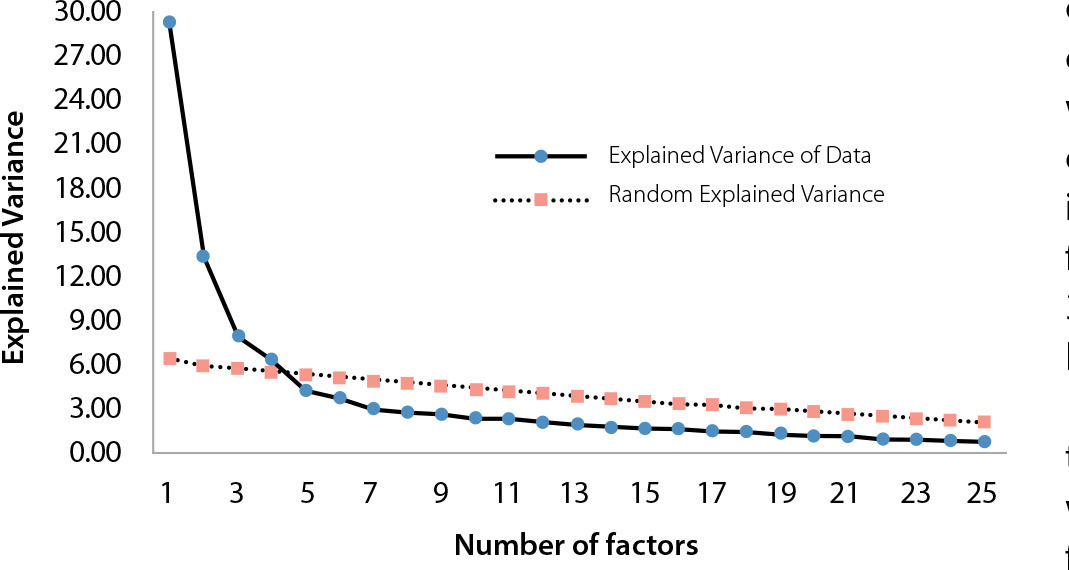
-
ORIGINAL ARTICLE07-29-2024
Nurses’ perspectives on nurses’ work methods
Revista Brasileira de Enfermagem. 2024;77(3):e20230374
Abstract
ORIGINAL ARTICLENurses’ perspectives on nurses’ work methods
Revista Brasileira de Enfermagem. 2024;77(3):e20230374
DOI 10.1590/0034-7167-2023-0374
Views0See moreABSTRACT
Objectives:
To analyze nurses’ perspectives on nurses’ work methods in the hospital context.
Methods:
A descriptive study with a qualitative approach was conducted in a hospital in northern Portugal, involving 17 nurses. Semi-structured interviews were used for data collection. Data collected between May and June 2023 underwent content analysis, supported by Atlas.ti software.
Results:
Three thematic areas emerged: “Nurses’ work methods in a hospital context,” highlighting the conception and components of work methods and the methods in use; “Implementation of nurses’ work methods,” emphasizing influencing factors and challenges to implementation; and “Impact of nurses’ work methods on patients, nurses, and institutions.”
Final Considerations:
Nurses’ work methods constitute the structure of nursing care. Some factors influence and some challenges arise in the implementation of these methods, producing impacts on patients, nurses, and institutions.

-
ORIGINAL ARTICLE07-29-2024
Nursing Process for institutionalized older adults: contributions from knowledge awareness workshop
Revista Brasileira de Enfermagem. 2024;77(3):e20230349
Abstract
ORIGINAL ARTICLENursing Process for institutionalized older adults: contributions from knowledge awareness workshop
Revista Brasileira de Enfermagem. 2024;77(3):e20230349
DOI 10.1590/0034-7167-2023-0349
Views0See moreABSTRACT
Objective:
To analyze the knowledge of professionals working in a Nursing Home about the Nursing Process before and after the awareness workshop.
Methods:
This is strategic action research, developed with nursing professionals and managers of a Nursing Home in Rio Grande do Sul, Brazil. Data were collected between January and June 2023, through semi-structured interviews before and after an awareness workshop. Discursive textual analysis of the data was carried out.
Results:
The central category “Understanding about the Nursing Process in Nursing Homes” emerged, which was unitized into two units of meaning and three categories of analysis.
Conclusion:
Data revealed non-use and lack of knowledge of the Nursing Process before awareness raising. Afterwards, a deeper understanding of the topic and its importance was identified. Awareness-raising workshops contribute to transformation of knowledge.
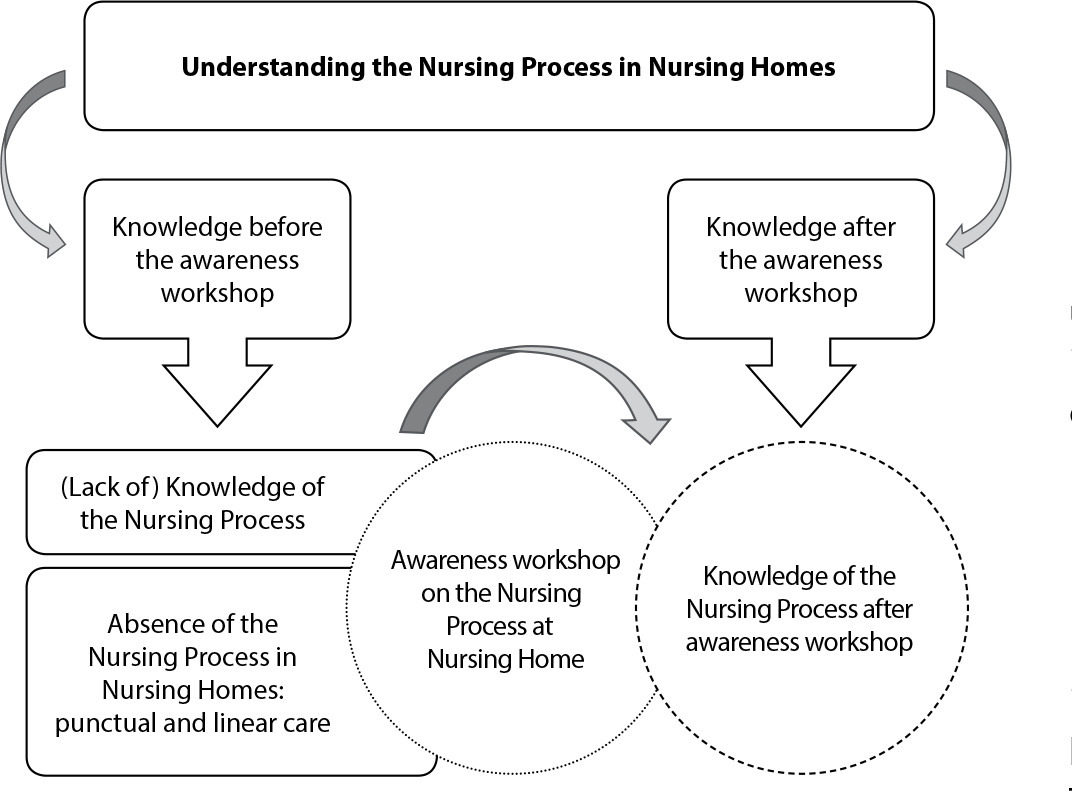
-
ORIGINAL ARTICLE07-29-2024
Excessive daytime sleepiness in nursing technicians: association with sleep quality and memory
Revista Brasileira de Enfermagem. 2024;77(3):e20230332
Abstract
ORIGINAL ARTICLEExcessive daytime sleepiness in nursing technicians: association with sleep quality and memory
Revista Brasileira de Enfermagem. 2024;77(3):e20230332
DOI 10.1590/0034-7167-2023-0332
Views0See moreABSTRACT
Objective:
to investigate excessive daytime sleepiness prevalence among nursing technicians and the association with sleep quality and memory.
Methods:
a cross-sectional, inferential study, carried out in a hospital unit in the state of Goiás between December 2020 and January 2021. Assessments were carried out using the Epworth Sleepiness Scale, the Pittsburgh Sleep Quality Index and the Prospective and Retrospective Memory Questionnaire, instruments validated for the Brazilian context. Bivariate and multivariate logistic regression analyzes were performed.
Results:
the sample consisted of 189 nursing technicians with a 40.9% excessive daytime sleepiness prevalence. In multivariate models, excessive daytime sleepiness was not associated with sleep quality, however there was a significant association with overall memory failures.
Conclusions:
study results demonstrate a high excessive daytime sleepiness occurrence, an association with overall memory failures and the need for psychosocial interventions for nursing technicians.
-
ORIGINAL ARTICLE07-29-2024
Educational technology for multidisciplinary training for managing waiting lists for elective patients
Revista Brasileira de Enfermagem. 2024;77(3):e20230299
Abstract
ORIGINAL ARTICLEEducational technology for multidisciplinary training for managing waiting lists for elective patients
Revista Brasileira de Enfermagem. 2024;77(3):e20230299
DOI 10.1590/0034-7167-2023-0299
Views1See moreABSTRACT
Objectives:
to construct and assess an educational technology for managing patient waiting lists for multidisciplinary training.
Methods:
study supported by Instructional Design – ADDIE model, whose stages of construction of educational technology were developed in the form of a multi-professional training course. Its respective content assessment was carried out by a committee of experts from 2021 to 2022. The analysis occurred based on the proportion of content adequacy with 95% Confidence Interval.
Results:
seventeen products were created as educational technology learning objects: five storyboards; four videos; three comic books; two pedagogical action plans; a mind map; and a YouTube® playlist. Nine experts assessed content adequacy, which reached 0.89.
Conclusions:
this educational technology contributes to the performance of professionals who manage waiting lists by reducing inequalities, alleviating differences, in addition to promoting equity in care and good health for patients in the Brazilian Health System.

-
ORIGINAL ARTICLE07-29-2024
Fuzzy Logic: vulnerability of women who have sex with women to sexually transmitted infections
Revista Brasileira de Enfermagem. 2024;77(3):e20230271
Abstract
ORIGINAL ARTICLEFuzzy Logic: vulnerability of women who have sex with women to sexually transmitted infections
Revista Brasileira de Enfermagem. 2024;77(3):e20230271
DOI 10.1590/0034-7167-2023-0271
Views0See moreABSTRACT
Objective:
To describe the possibility of applying Fuzzy Logic in analyzing the vulnerability of Women Who Have Sex with Women to Sexually Transmitted Infections/HIV/AIDS.
Methods:
We developed a Fuzzy Logic system with 17 input variables and one output variable, using data related to vulnerability in a municipality located in the Midwest region of the State of São Paulo, Brazil.
Results:
The factor with the greatest positive impact was the confirmation that a low understanding of Sexually Transmitted Infections/HIV/AIDS is associated with higher vulnerability. Conversely, the statement “Not disclosing sexual activity to healthcare professionals,” where individuals do not admit to having sex with women, had the least impact.
Conclusions:
Fuzzy Logic facilitates the identification of vulnerability, expressed through the analysis of interaction between variables in each dimension. This makes it a promising method to assist in analyzing the vulnerability of specific populations.
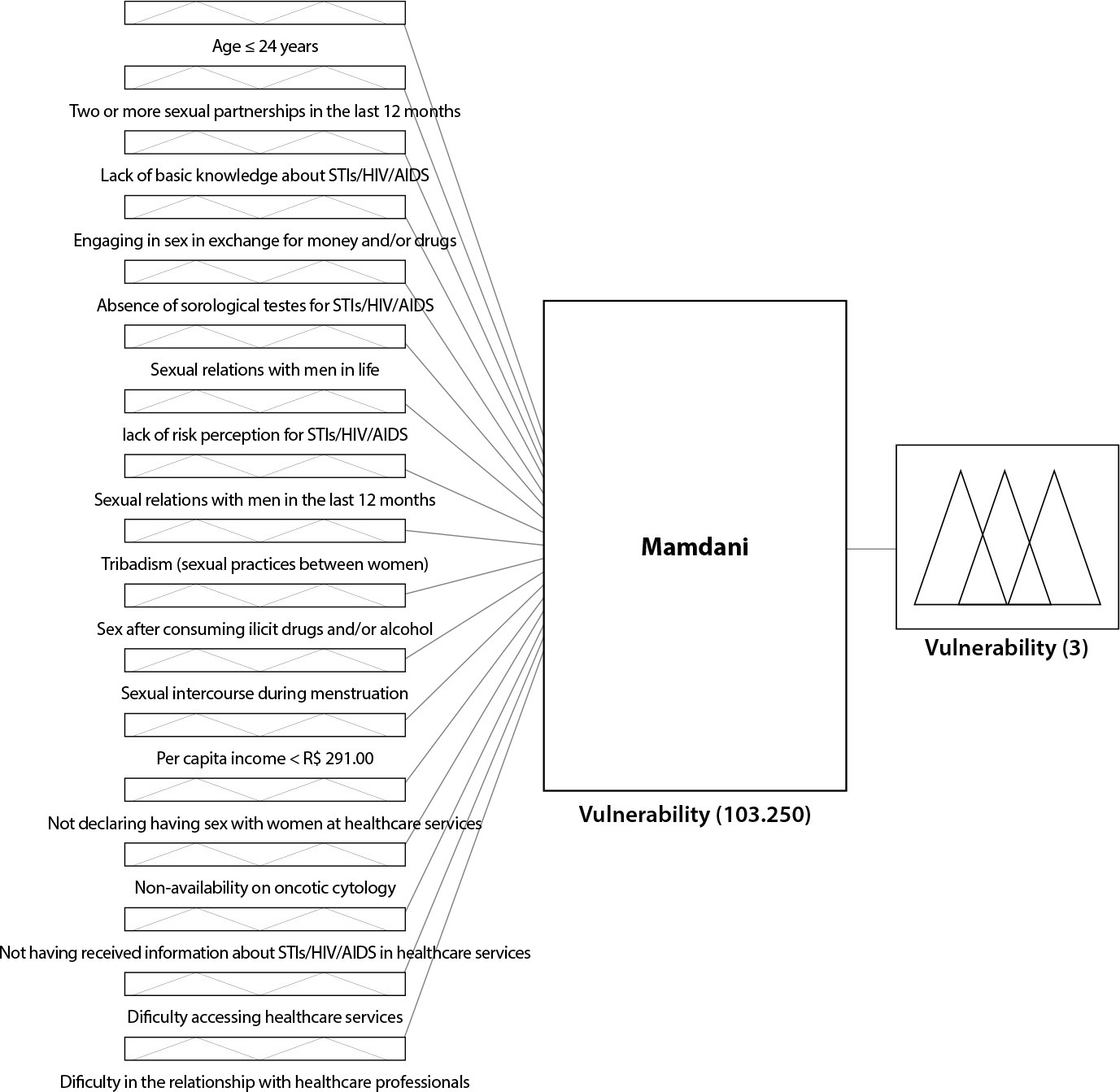
-
ORIGINAL ARTICLE07-29-2024
University Student Depression Inventory, Brazilian Version, Construct Assessment
Revista Brasileira de Enfermagem. 2024;77(3):e20230232
Abstract
ORIGINAL ARTICLEUniversity Student Depression Inventory, Brazilian Version, Construct Assessment
Revista Brasileira de Enfermagem. 2024;77(3):e20230232
DOI 10.1590/0034-7167-2023-0232
Views0See moreABSTRACT
Objectives:
to assess the University Student Depression Inventory, Brazilian version (USDI-BR), construct.
Methods:
a methodological study carried out with a snowball probabilistic sample, consisting of 334 undergraduate and graduate students. Confirmatory factor analysis, reliability using McDonald’s omega coefficient and Cronbach’s alpha were performed. Principal component analysis was performed using the varimax rotation and oblimin rotation, using the Kaiser-Meyer-Olkin criteria, Bartlett’s test of sphericity and scree plot.
Results:
the USDI-BR presented an internal consistency of items of ω = 0.95 and remained with 30 items, with the addition of 1 factor (Death wish and social withdrawal), totaling 4 factors.
Conclusions:
the USDI-BR has evidence that points to its validity and also its internal consistency, deserving that new studies be carried out to expand the evidence of its psychometric properties.
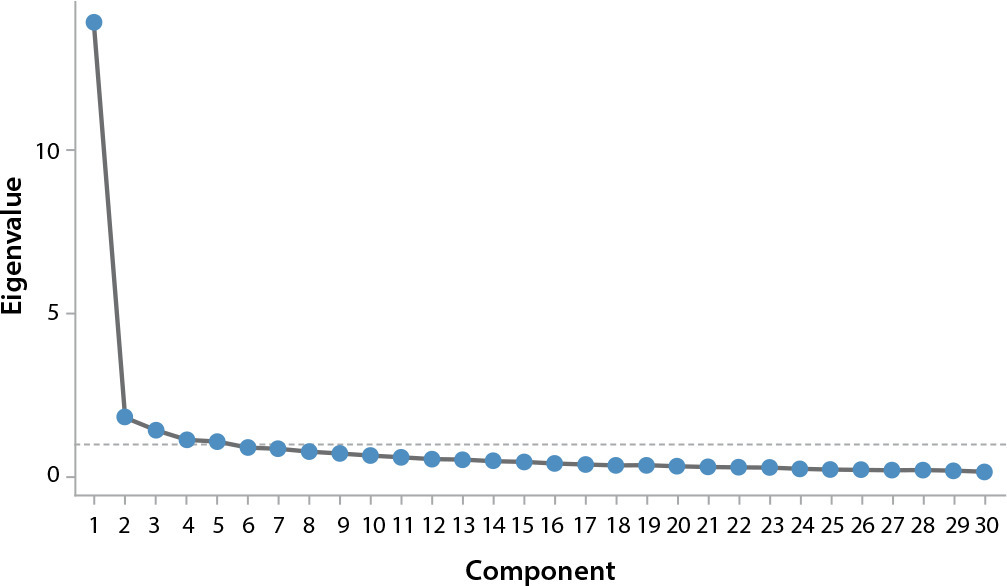
-
ORIGINAL ARTICLE07-29-2024
Family refusal of skin donation for transplantation: trends and associated factors
Revista Brasileira de Enfermagem. 2024;77(3):e20230209
Abstract
ORIGINAL ARTICLEFamily refusal of skin donation for transplantation: trends and associated factors
Revista Brasileira de Enfermagem. 2024;77(3):e20230209
DOI 10.1590/0034-7167-2023-0209
Views0See moreABSTRACT
Objectives:
to analyze the trends and factors associated with family refusal of skin donation for transplantation.
Methods:
this cross-sectional study was conducted in the State of São Paulo, with family authorization terms collected from 2001 to 2020. The variables analyzed included year, age, gender, cause of death, and type of institution. Data were analyzed using linear and multiple logistic regression, with the Odds Ratio estimated at p<0.05 for statistical significance.
Results:
1,355 individuals refused skin donation. The trend of refusals decreased between 2001 and 2009 in the age groups of 0-11 years and 12-19 years, but increased in the group aged ≥60 years. This trend continued to decrease in the 0-11 years group from 2010 to 2020, and increased in the 20-40 years group. Males and the age groups of 20-40 years, 41-59 years, and ≥60 years exhibited 27%, 34%, 47%, and 53% lower chances of refusal, respectively.
Conclusions:
there is an urgent need for measures to mitigate the high number of refusals associated with skin donation.
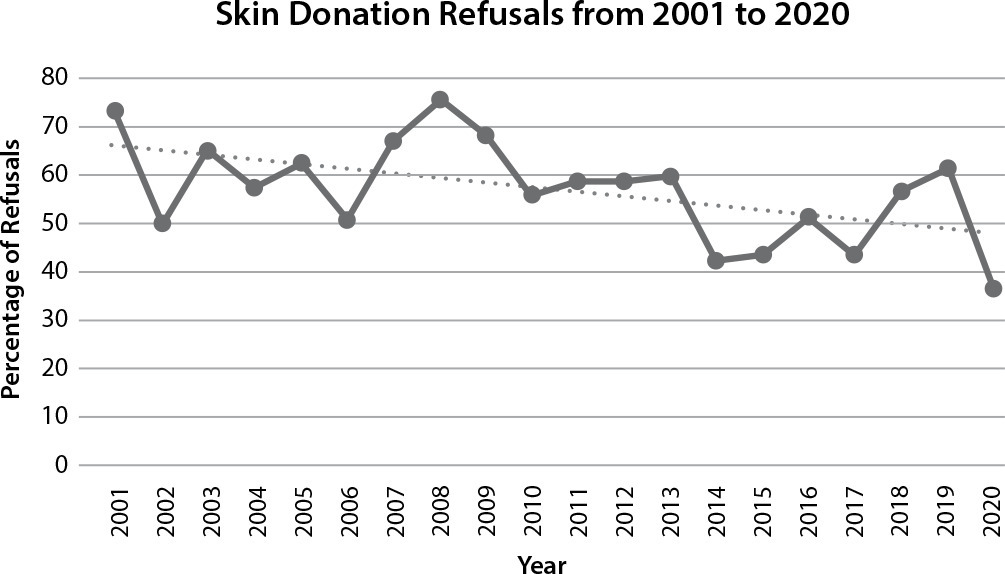
Search
Search in:
Nuvem de Tags
Adolescente (85) Atenção Primária à Saúde (239) COVID-19 (91) Criança (91) Cuidados de Enfermagem (269) Educação em Enfermagem (151) Educação em Saúde (139) Enfermagem (930) Enfermagem Pediátrica (86) Estudantes de Enfermagem (77) Estudos de Validação (131) Família (87) Idoso (208) Promoção da Saúde (99) Qualidade de Vida (104) Saúde do Trabalhador (86) Saúde Mental (145) Saúde Pública (82) Segurança do Paciente (150) Tecnologia Educacional (100)



